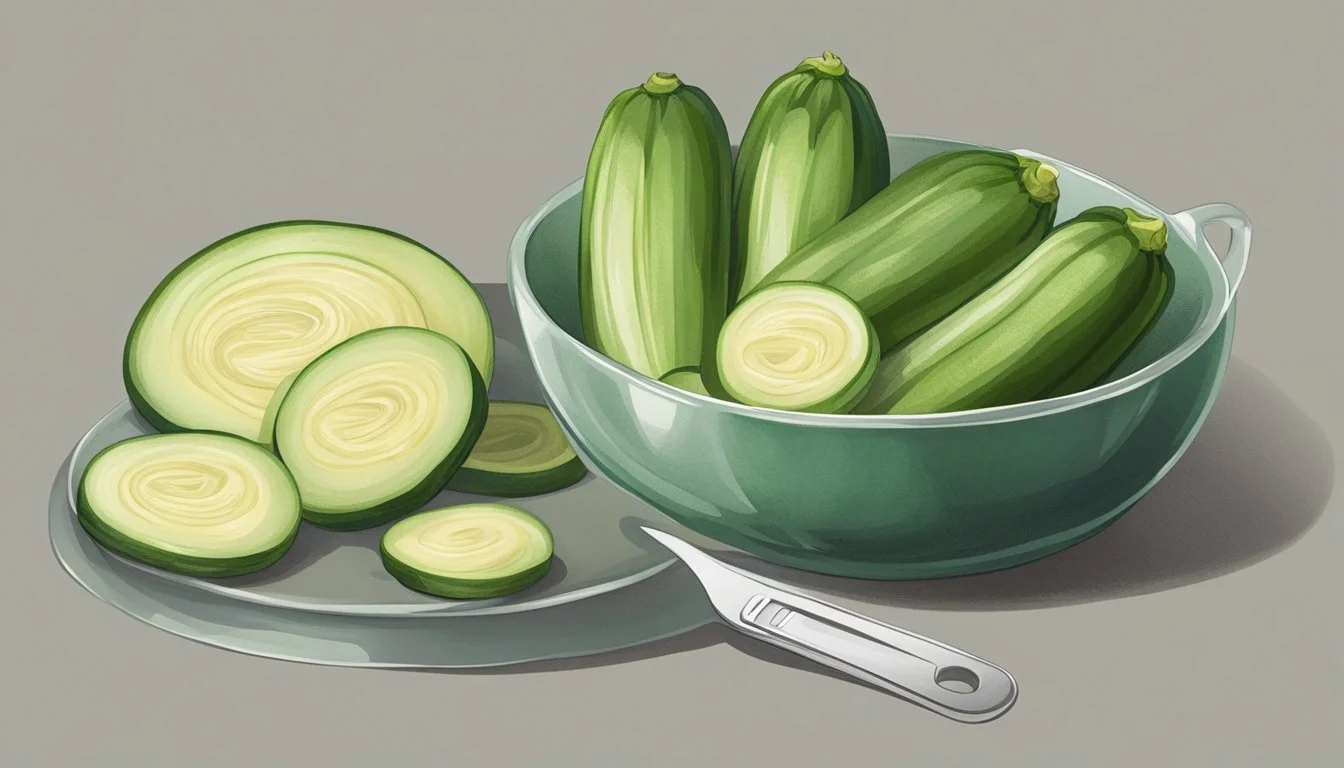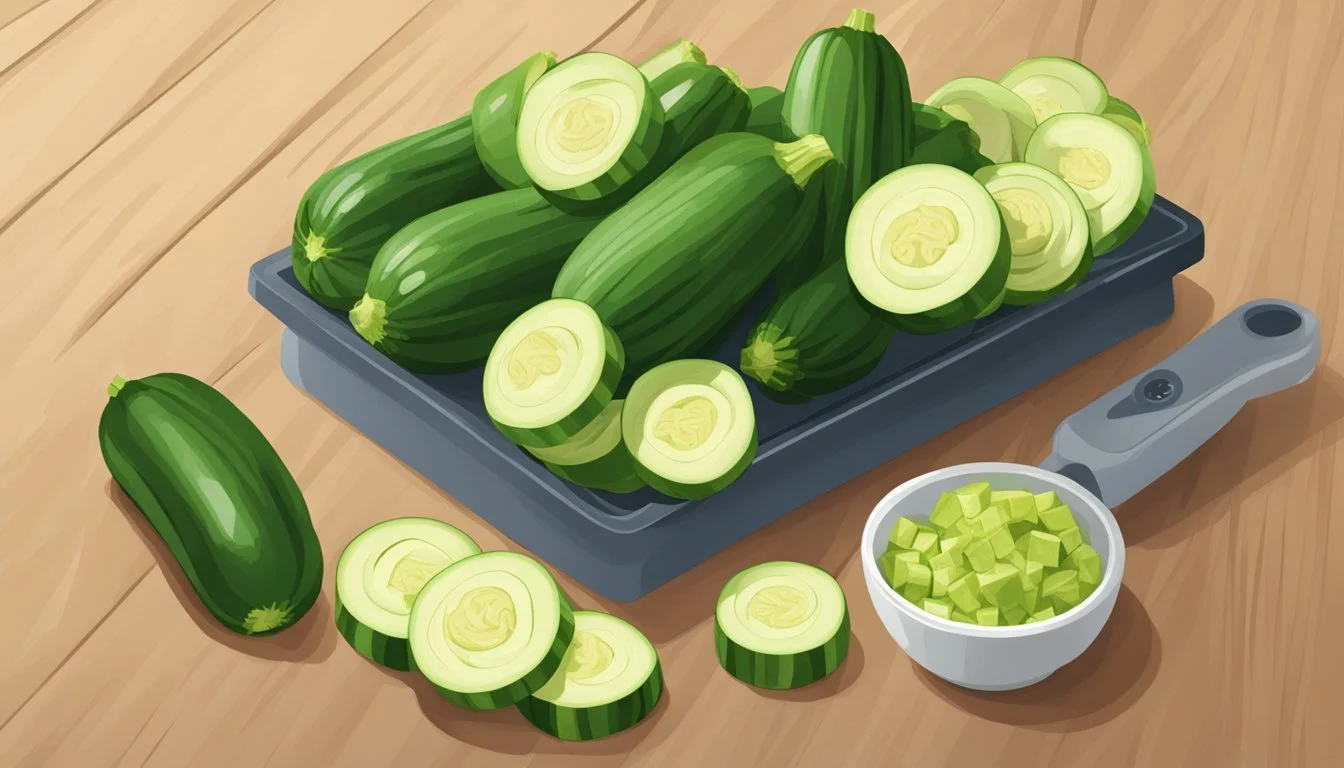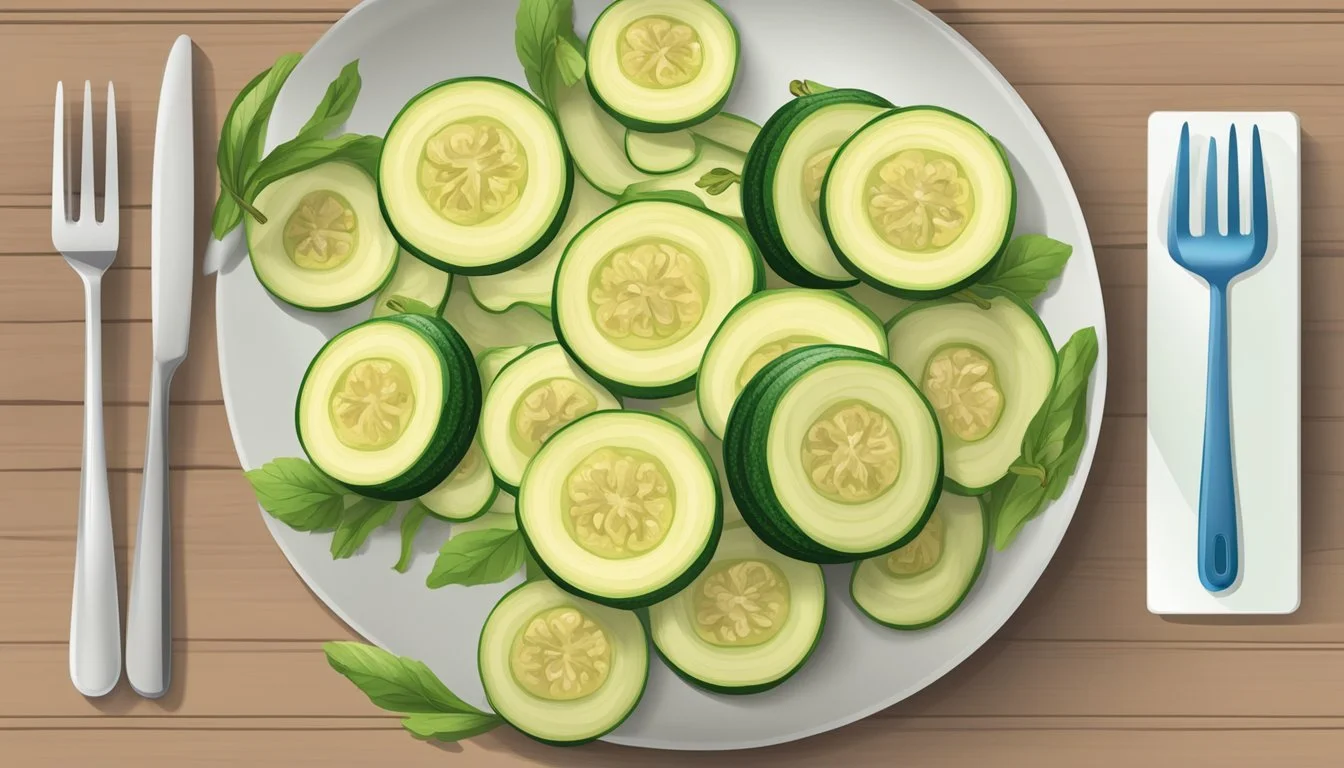How Many Servings of Zucchini to Optimize Fiber Intake
A Nutritional Guide
Zucchini (What wine goes well with zucchini?) is a versatile vegetable that is low in calories and high in nutritional value, making it a beneficial addition to any balanced diet. As a rich source of fiber, incorporating zucchini into meals can help individuals meet their daily fiber intake needs, which are crucial for digestive health. The fiber in zucchini not only promotes regular bowel movements but also helps to maintain a healthy gut environment.
Understanding the health benefits of zucchini, it is clear that this vegetable is more than just a low-calorie option for those looking to lose weight. The presence of fiber contributes to a feeling of fullness, which can reduce overall caloric intake by curtailing the desire to snack between meals. Additionally, the fiber in zucchini plays a role in managing blood sugar levels, making it especially advantageous for individuals with diabetes or those trying to prevent the condition.
In terms of serving size, health experts suggest that including zucchini as part of a varied diet can contribute significantly to fiber intake. A single serving can provide a meaningful amount of the daily recommended fiber, supporting not only digestive health but also promoting a range of other health benefits. Regular consumption of fiber-rich vegetables like zucchini is associated with a lower risk of chronic diseases, underscoring the importance of understanding the optimal servings for individual dietary needs.
Nutritional Profile of Zucchini
Zucchini, also known as courgette, is a summer squash that is low in calories and high in water content. A typical one-cup serving of chopped, raw zucchini weighs around 124 grams and contains only 21 calories, making it a weight-friendly vegetable. Here's a detailed breakdown of its nutritional content:
Calories: 21
Protein: 1.5g
Fat: 0.4g
Carbohydrates: 3.9g
Fiber Content: ~1g
Sugar: 3g
Water Content: 118g
In terms of vitamins and minerals, zucchini is an excellent source of vitamin C and vitamin B6, both essential for the body's immune and nervous system functions, respectively. The squash also contains a notable amount of potassium, with about 324 milligrams per cup, important for cardiovascular health.
Moreover, zucchini is a source of:
Magnesium
Phosphorus
Manganese
These minerals contribute to bone health, energy production, and the regulation of blood sugar levels. Not to be overlooked are its antioxidants, which include the nutrients vitamin A, vitamin K, and folate. These components play critical roles in vision, blood clotting, cell division, and growth.
Zucchini’s iron content supports the formation of hemoglobin, while its modest amounts of fiber aid in digestive health. Consuming zucchini can help individuals meet their daily fiber intake goals, while also providing a range of other beneficial nutrients.
Health Benefits of Zucchini Fiber Intake
Zucchini, a nutrient-rich vegetable, is a good source of both soluble and insoluble fiber. Incorporation of zucchini in the diet promotes digestive wellness and may contribute to better heart health, improved diabetes management, and other health benefits.
Digestive Health
Zucchini's fiber content aids in maintaining regular bowel movements and helps prevent constipation. Soluble fiber within it dissolves into a gel-like substance, enhancing stool bulk. This process supports a healthy colon by simplifying the passage of waste through the digestive tract.
Cardiovascular Health
The high fiber content in zucchini can influence heart health by assisting in the reduction of blood pressure and improving cholesterol levels. Insoluble fiber, particularly, has been linked to a lower risk of heart disease as it can help to reduce the absorption of cholesterol into the bloodstream.
Diabetes Management
Fiber-rich foods like zucchini slow down the absorption of sugars in the blood, thus helping to regulate blood sugar levels. This makes zucchini beneficial for individuals with type 2 diabetes, as it can contribute to more stable glucose readings and insulin responses.
Weight Management
High-fiber vegetables, including zucchini, can be a key factor in weight loss strategies due to their ability to provide a feeling of fullness with low calorie content. Eating zucchini may lead to a reduced overall caloric intake, aiding in weight management.
Cancer Prevention
Dietary fiber from zucchini can reduce the risk of several cancers, notably those of the gastrointestinal tract. Antioxidants present in zucchini, such as vitamin C, may play a role in the prevention of certain cancers by combatting free radicals.
Eye Health
Zucchini is rich in antioxidants like lutein and zeaxanthin that are essential for eye health. These compounds may help protect from macular degeneration and cataracts, conditions that commonly impair vision.
Integrating Zucchini into Your Diet
Introducing zucchini into one's diet is a straightforward way to boost fiber intake. This section offers practical advice on cooking methods, recipe ideas, and using zucchini as a versatile substitute.
Cooking Methods
Zucchini can be prepared in various ways to complement any meal. Here are some popular methods:
Grilled: Cut zucchini lengthwise and grill for a smoky flavor.
Sautéed: Dice or slice and sauté with olive oil and herbs for a quick side.
Baked: Incorporate into muffins or breads for added moisture and nutrition.
Recipe Ideas
Incorporating zucchini into recipes is both simple and beneficial for increasing fiber. Consider the following:
Salads: Shred zucchini into salads for a nutritious crunch.
Soups: Add diced zucchini to soups for a vitamin-packed ingredient.
Muffins and Breads: Grate zucchini into batter to make moist and healthier baked goods.
Zucchini as a Substitute
Zucchini serves as an excellent substitute in many dishes, particularly for those seeking low-carb options:
Pasta Replacement: Turn zucchini into noodles, or "zoodles," for a low-carb alternative to pasta.
Courgette in Place of Starches: Use thinly sliced zucchini in casseroles or lasagna to replace higher-carb layers.
Baked Goodies: Substitute zucchini for part of the oil or eggs in sweet recipes to reduce fat and increase fiber.
Recommended Daily Intake and Serving Size
For a healthy diet, adults aged 19 to 50 should aim for a daily fiber intake of at least 25 grams for women and 38 grams for men. Zucchini is a nutritious vegetable that contributes to this fiber goal.
A single serving of zucchini, which is about 1 cup of chopped raw zucchini (approximately 124 grams), holds approximately 1 gram of fiber. Given the total daily recommended fiber intake, individuals would need to consume multiple servings of zucchini as part of a varied diet to meet their fiber needs.
Here is a breakdown of zucchini's nutritional contributions per serving:
Fiber Content: 1 gram
Calories: 21
Protein: 1.5 grams
Carbohydrates: 4 grams
To integrate zucchini into a balanced diet for fiber, one might consider the following portion sizes:
Small-sized zucchini: 1 whole zucchini (roughly equivalent to 1 cup chopped)
Large-sized zucchini: half of the zucchini (roughly equivalent to 1 cup chopped)
Incorporating zucchini as part of the daily vegetable intake is beneficial. As a guideline, teenage girls should have at least 2.5 cups of vegetables daily, while teenage boys should aim for 3 cups. Adults' serving sizes will vary based on dietary needs and activity levels.
Zucchini can be a part of the total daily servings of vegetables recommended by dietary guidelines which include a variety of vegetables for nutrient diversity. Multiple servings of different vegetables, including zucchini, are essential to fulfill not just fiber requirements but also other vital nutrients for a well-rounded diet.
Precautions and Potential Risks
When considering the fiber intake from zucchini, individuals should be aware of a few potential risks and take certain precautions.
Allergies: Though rare, some people may have an allergy to zucchini. Individuals with known sensitivities to other members of the Cucurbitaceae family (like cucumbers or melons) should exercise caution.
Oxalates: Zucchini contains oxalates, which, when accumulated in body fluids, can crystallize and cause health issues for people with kidney stones or kidney diseases.
People with irritable bowel syndrome (IBS) may find high-fiber foods like zucchini to exacerbate their symptoms. They should monitor their reaction to zucchini and adjust their intake accordingly.
Regarding cholesterol levels, while fiber is generally beneficial for managing cholesterol, individuals with specific lipid disorders should consult their healthcare provider for personalized advice.
Lastly, zucchini has a low glycemic index, which means it has a minimal impact on blood sugar. However, those monitoring their blood glucose should consider their overall meal composition when consuming zucchini to ensure it is balanced.
In table format, the considerations are:
Concern Description Suggestion Allergies Zucchini allergies, cross-reactivity with cucurbits Proceed with caution Oxalates Can contribute to kidney stones in susceptible individuals Consume in moderation IBS High-fiber foods might trigger symptoms Monitor and adjust intake Cholesterol May benefit cholesterol levels Consult with a doctor for advice Blood Sugar Low impact on blood sugar Monitor overall meal balance
It is always recommended to consult with a healthcare provider before making significant dietary changes, particularly for individuals with pre-existing health concerns.
Understanding Fiber: Soluble vs. Insoluble
Fiber is an essential nutrient for the human body, playing a pivotal role in maintaining digestive health. It is broadly categorized into two types: soluble fiber and insoluble fiber. Both types offer significant health benefits, although they function differently within the body.
Soluble fiber dissolves in water, forming a gel-like substance. This process slows down digestion, which can help control blood sugar levels and reduce cholesterol. Foods rich in soluble fiber include oats, legumes, apples, and blueberries.
Insoluble fiber, on the other hand, does not dissolve in water. It adds bulk to stool and aids in keeping bowel movements regular, thereby preventing constipation. Sources of insoluble fiber include whole wheat, brown rice, carrots, and cucumbers.
Soluble Fiber Insoluble Fiber Slows digestion Adds bulk to stool Controls blood sugar Improves regularity Reduces cholesterol Prevents constipation Found in oats, legumes, fruits Found in whole grains, vegetables
The body requires both types of fiber to support a healthy digestive system. While they each have distinct functions, they often coexist in the same foods. For example, zucchini contains both soluble and insoluble fiber, contributing to the regulation of digestion and promoting bowel health. By incorporating a variety of fiber-rich foods into one's diet, an individual can reap the full range of health benefits that dietary fiber has to offer.
Comparing Zucchini to Other Vegetables
Zucchini, a type of summer squash, is a nutrient-dense vegetable often compared with other vegetables to evaluate its fiber content and overall health benefits. It is low in calories, with a typical zucchini containing just 19 calories. Compared to vegetables like cucumbers which are also low in calories, zucchini offers a commendable fiber content.
In terms of fiber, a cup of sliced zucchini has around 1 gram of dietary fiber. This is relatively moderate when placed alongside other fiber-rich vegetables—for example, the same serving size of broccoli provides about 2.4 grams of fiber. Despite this, zucchini remains a beneficial addition to a balanced diet with its unique nutrient profile.
Nutritional Composition (per 100g serving):
Nutrient Zucchini (raw) Cucumber (raw with peel) Broccoli (raw) Calories 17 15 34 Fiber 1g 0.5g 2.6g Vitamin C 17.9mg 2.8mg 89.2mg Potassium 261mg 147mg 316mg
Zucchini also stands out for its vitamin content, particularly vitamin C, with a raw zucchini offering about 17.9mg. This is substantially higher than that found in cucumbers, which contain roughly 2.8mg of vitamin C. Zucchini is closer to mixed frozen vegetables in vitamin C content, even though the latter is considerably lower at 3.2mg after cooking.
When it comes to identifying a vegetable that is a good blend of low calories, decent fiber, and a robust array of nutrients, zucchini is a strong contender. It is an excellent choice for individuals seeking to increase their fiber intake without adding too many calories to their diet. Furthermore, zucchini is versatile and can be included in various recipes, enhancing the nutritional value of meals beyond fiber content.
Zucchini and Overall Lifestyle Considerations
Incorporating zucchini into one's diet can offer multiple health benefits that align with a heart-healthy and balanced lifestyle. Naturally low in calories and high in fiber, zucchini contributes to maintaining a healthy weight and supports digestive health.
Fiber Content:
Aids in digestion
May reduce the risk of heart disease and stroke
Helps maintain lower cholesterol levels
Zucchini is not only beneficial for the gut but also for the cardiovascular system. It contains potassium, which is essential for heart health, potentially helping to lower high blood pressure, a risk factor for heart disease. Moreover, its fiber content plays a role in managing cholesterol levels by helping reduce low-density lipoprotein (LDL), commonly known as 'bad' cholesterol.
Vitamins and Minerals:
Vitamin C: antioxidant properties, important for skin health
Manganese: contributes to healthy bone structure and bone metabolism
Antioxidants present in zucchini, such as carotenoids, combat the oxidative stress caused by free radicals, which can lead to chronic inflammation. Including zucchini as part of a diet rich in fruits and vegetables can therefore be a strategic choice for those seeking to minimize inflammation-related health issues.
A Healthy Lifestyle Choice:
Nutrient Benefit Fiber Supports a healthy weight, reduces cholesterol Potassium Aids in heart health Carotenoids Mitigates oxidative stress Vitamin C & Manganese Important for skin and bone health
By considering zucchini as a regular part of a balanced diet, individuals may enjoy various health benefits that contribute to longevity and well-being. It is an adaptable vegetable that easily assimilates into different cuisines, making it a practical choice for enhancing overall nutrition.








